This post contains affiliate links (I get a commission at no extra cost to you for purchases made through links in this post).
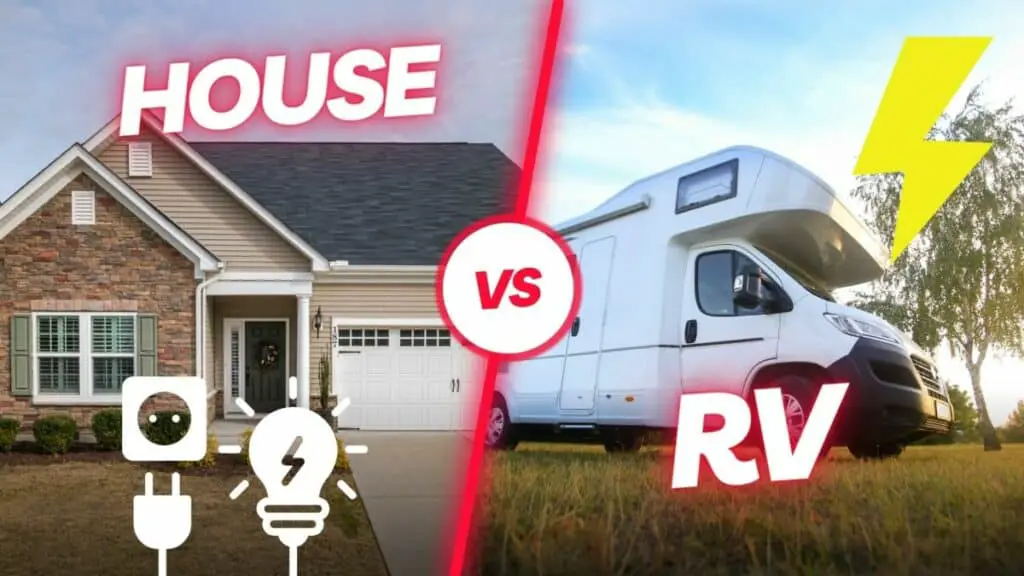
The draw of the RV life is stronger than ever because of its freedom to travel. They’re also generally considered cheaper and easier to maintain than houses. One of the most pressing questions for RV owners is whether RVs consume more or less energy than a house.
An RV uses over 600 kWh of electricity each month, while a house uses around 900 kWh. However, these numbers vary based on the type of RV or house, the number of people living there, location, time of year, and the appliances in use. Houses typically cost more in electricity.
In the rest of this article, I will discuss whether living in an RV will save you money on electricity and explain the benefits and drawbacks of this on-the-road lifestyle. I will also provide tips to keep your RV electricity bill as low as possible.
My RV electricity bill for full-time use is 0; yes, ZERO! Although I am boondocking all the time and using 640W of solar panels with 200AH of lithium batteries, it is even possible to cut your RV electricity bills to zero!
Can Living in an RV Save You Money on Electric Bills?
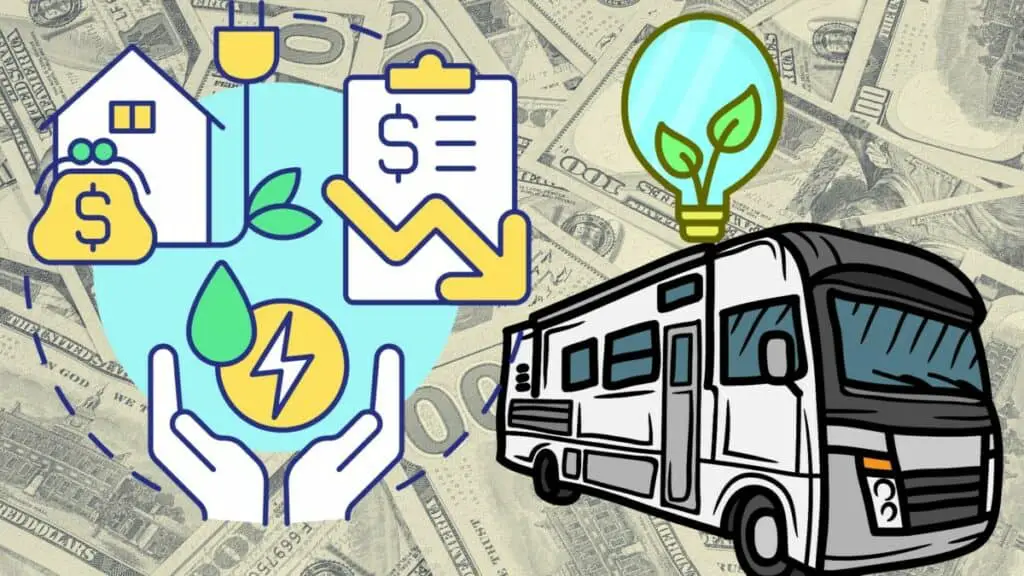
Living in an RV gives you incredible control over your cost of living, and it can save you money on your electric bills. If you don’t like what you’re paying for amenities in one place, you can easily travel to a place with more agreeable prices. In this way, you can save money on electricity bills.
The cost of electricity varies significantly in different states and countries. For example, Hawaii charges the most for electricity at about 37 cents per kWh. Therefore, electricity costs for an RV in Hawaii might be as expensive as using electricity in a house in another state.
An essential thing to consider is the items in RVs and traditional homes that use the most electricity. So what are the most significant energy drains in a home and RV?
Lighting
Lights aren’t usually the most intensive energy users, but they can certainly add up over time. On average, people use lights for about 2-3 hours per day, almost doubling their use in the winter. On average, lights make up around 25-30% of a monthly electric bill.
However, this number varies considerably based on how responsible you are with your light usage and the type of bulbs used. For example, LEDs are generally cheaper than standard fluorescent bulbs.
Electricity costs are typically higher in fancy RV parks than what you would get at home. Luckily, most RVs have plenty of windows that provide enough sunlight, allowing you to forgo the need for lights unless it’s very dark.
You also have less space and lights to forget that you turned on than in a house, and everyone in the family doesn’t have their room and their own lights on all the time; instead, there is pretty much just one room at a time to keep lit, and if that is by LED-lights this cost is most often insignificant.
You can also opt for boondocking to keep your energy costs low.
Air Conditioning
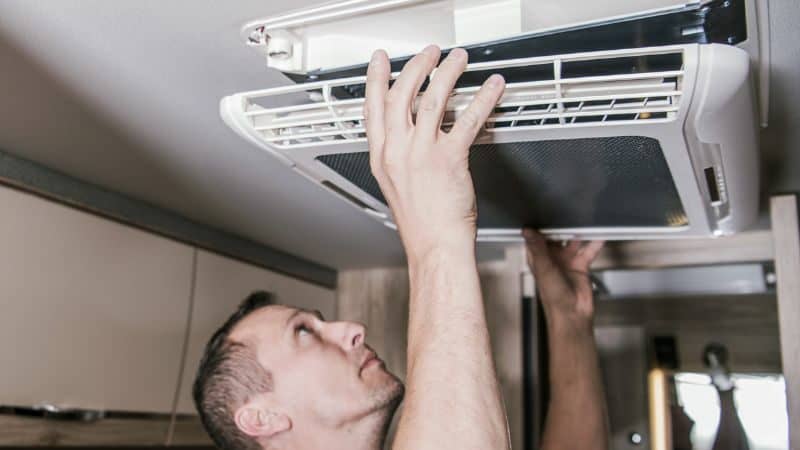
Air conditioning is one of the most expensive electric costs in both homes and RVs, especially in warm climates and during the summer. Air conditioners use a lot of power to make the surrounding area colder. The larger the space, the more it will cost to keep cool.
However, RVs typically pay a little more for electricity in RV parks, where they charge more than normal utility suppliers.
Air conditioning your RV typically costs around $25 per day if you run the unit for over 12 hours daily. But this number varies based on your location and the unit your RV has installed. Since few people use air conditioners for that long, energy consumption should remain low.
So the air conditioner, as well as all items that create heat or cold like heaters or fridges, will be the major electricity consumers, and those are the places where we should spend the most time trying to limit usage.
In contrast, a traditional home’s air conditioning will generally cost you over $6 per day if you live in an average-sized home. But, again, the amount you spend on air conditioning varies based on your area’s energy prices and climate.
For the most part, running an air conditioner in a traditional home is much cheaper.
But of course, this will vary depending on the electricity deal at the campground.
Heating
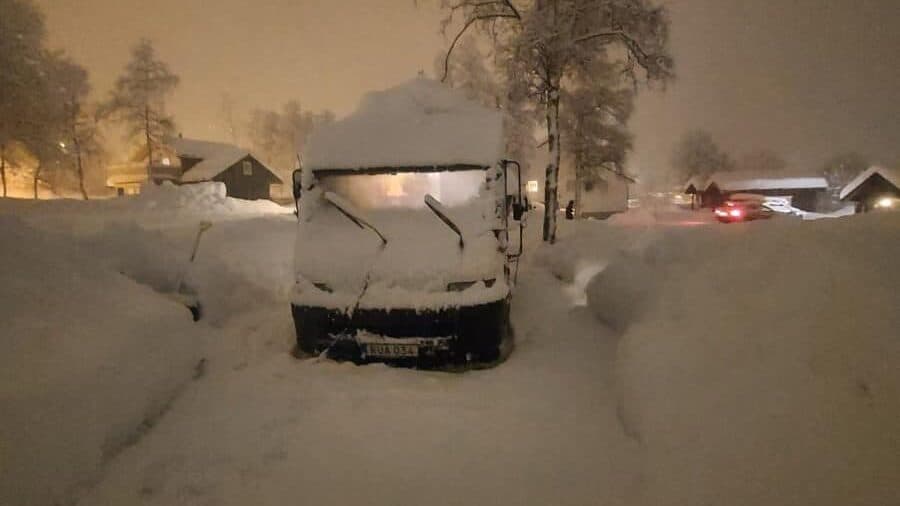
Another massive energy user is the heating unit. When it comes to heating a home, you will generally utilize a fuel like propane or electricity. Most RVs also use propane or electricity to keep warm in colder months.
Utilizing propane is a fantastic way to keep your energy costs down in the winter, regardless of whether you live in an RV or a house.
Most RVs are much cheaper to heat up during the winter at the cost of around 300 USD, while a staggering 500 USD per month for a house! But more on the difference between heating an RV VS a house in this other article I wrote.
Although many RVs and homes pay approximately the same for heating depending on what type of heating system is used. You might think, well, that doesn’t add up; an RV is much smaller!
Yes, but RVs are generally much worse insulated than a house, so this can even things out, for example when I spent last winter in Norway, it cost me about 300 USD per month to heat my motorhome with propane, but more on the costs of heating RVs in the winter you can find in my other article here.
Appliances
The appliances are another reason for high energy costs in a home and RV. Most of us can’t live without our favorite electronic comforts, which is valid for both homeowners and RV owners.
Some of the highest energy-using appliances, except AC and heaters, include:
- Refrigerators
- Water heaters
- Washer and dryer units
- Ovens
- Dishwashers
- TVs
These are just a few of the most energy-intensive appliances in both homes and RVs. Typically, RV appliances use less power than a traditional unit, which is why RV-specific appliances like refrigerators, washers, and dryers are often smaller.
You will probably pay less for appliances in an RV since they typically use less energy. For example, the average RV fridge uses about 150 kWh of energy each month if it’s run constantly. Its costs differ based on where you’re staying and if you’re using solar energy.
On the other hand, traditional houses spend quite a bit keeping appliances running through the month. On average, you will pay about $21.96 monthly to keep a fridge running. Learn exactly how much propane different RV fridges use in this article I wrote.
What Uses the Most Electricity in an RV?
For most RV owners, staying in an RV is about leading simple, minimalistic lives. Thus, there’s minimal usage of heavy energy-intensive appliances. However, some appliances, like fridges or washers, are a necessity. So what appliance uses the most electricity in an RV?
The refrigerator uses the most electricity in an RV besides an AC or a furnace. Though RV fridges typically utilize less power than large house refrigerators, running one for hours will use most of the power in your rig. The fridge’s heavy energy consumption can quickly drain your batteries.
However, if you plug your RV into a power grid, your fridge’s energy use shouldn’t be a problem. Of course, electricity costs are higher in fancy RV parks, but you can stay in cheaper places while traveling.
Tips To Reduce RV Electricity Costs

The start-up costs of transitioning to an RV can be expensive. However, after the initial investment, you have a lot of freedom regarding what you pay for utilities.
Here are some tips to reduce your RV’s electricity costs.
- Install solar panels. Although solar panels are expensive, they’re worth the investment. After the initial investment, solar energy becomes a cheaper alternative to electricity.
- Stay off the grid. Staying off the grid is an excellent way to reduce your monthly electrical costs. As long as you have solar energy for essential appliances, you can stay in a remote location without paying extra for electricity.
- Cover up your vents. The vents on your RV allow heat or cool air to escape. Covering the vents reduces your need to run the heater or air conditioner continuously.
- Insulate your RV. Generally, RVs come insulated, but it’s always a good idea to add extra layers if your rig struggles to keep its temperature. The less time you spend heating or cooling the RV, the more money you save.
- Use an RV skirt. An RV skirt is an insulator that goes around the RV to prevent a cold draft from going under the unit and seeping into your rig. These skirts are an excellent option if you travel in cold areas.
- Travel to places with ideal temperatures. If you time your traveling correctly, you can avoid extreme temperatures, thus limiting the energy consumption of your heating and cooling units.
You can also sign up to work at a campground, where they might compensate you with free housing and electricity. Campground sitting can be a fun way to live and travel without spending much money.
Living in an RV vs. House
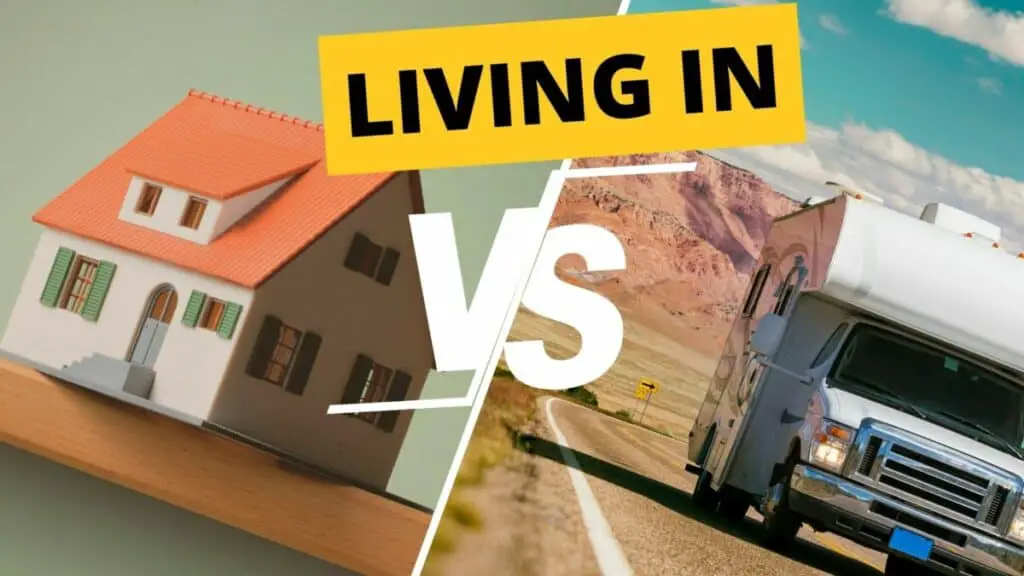
There are many factors to consider when deciding between a traditional home or an RV. Both have many benefits and drawbacks. How much you pay for either will vary based on your location and how frugally you can live.
A house’s monthly mortgage payment is generally much higher than an RVs loan, but RV loans have higher interest rates. However, you still have to factor in the cost of gas and payment for a nice truck to haul the trailer, especially if you’ve selected a gooseneck trailer.
On the other hand an old van or RV, you might be able to pay with cash upfront and not have to worry about any loans!
While you might need to pay more for electricity when staying in RV resorts, living off the grid in an RV is still cheaper than owning a house. Boondocking is a fantastic way to stay in places for free. However, you will need to invest in items like solar panels and maybe even a generator.
Ultimately, living in a house is a more stable way of living. You know exactly what your monthly expenses and utilities are. Living in a traditional home is more expensive, but you get more space, and your cost of living isn’t dependent on gas prices and a functional vehicle. Plus, a home is more suitable for a large family.
In contrast, RV living can be cheaper if you’re frugal and good at living off the grid. Living in an RV will cost you as much or as little as you want. However, you still have to consider the cost of things like refilling water tanks and dumping sewage, which aren’t a concern for homeowners.
Is it Financially Smart to Live in an RV?
There are many financial benefits to the RV life, especially when comparing electricity sources. But what about other costs? Is it wise to live in an RV if you want to save some money?
It is financially smart to live in an RV for those who love to travel and don’t mind the space constraints. Living in an RV full-time is often cheaper than living in a traditional home, especially considering maintenance costs, rent, mortgages, and utilities.
However, it’s important to note that the cost of RV life depends on your approach to it. For example, RV resorts are more luxurious than boondocking or living in campsites, but they also cost more.
Purchasing your rig and vehicle will lower your monthly costs, although the initial investment may be high.
Conclusion
Electricity usage in a home and RV significantly varies from person to person. However, on average, a home requires more electricity than an RV, making it more expensive.
You can always move an RV somewhere with cheaper electricity costs, thus making RV living more financially advantageous.
However, you will have to deal with fluctuating voltages, a considerable factor driving up RV electricity costs.
Sources
- Michigan RV Campgrounds: Cut Energy Costs and Increase Efficiency in Your RV
- YouTube: LineScrew1: RV Electric Bill: Cost Per Month?
- Crow Outdoors: How Much Electricity Does An Rv Use In One Month?
- Go Downsize: How Much Electricity Do RVs Use? (Numbers & Tips)
- RVing Trends: How Much Electricity Does an RV Use in One Month?
- RV Profy: How Much Electricity Does an RV Use in One Month?
- RV Expeditioner: How Much Electricity Does an RV Use?
- RV Forum: What is Your Average Electric Bill?
- Axle Addict: What Will I Have to Pay for RV Utilities? (How to Cut Costs)
- Heath and Alyssa: 29 Reasons Living in an RV is Better Than Living in a House
- Constellations: How Much Energy Does a House Use?
- EnergySage: How Many Watts Does a Light Bulb Use?
- Renaissance: How Your Lights Affect Your Electric Bill
- Living Cost: Cost of Living in Hawaii
- US Department of Energy: Propane Fuel Basics
- Urban Adventure: How Much Electricity Does an RV Use in One Month? Surprising Facts For Every RV Owner
